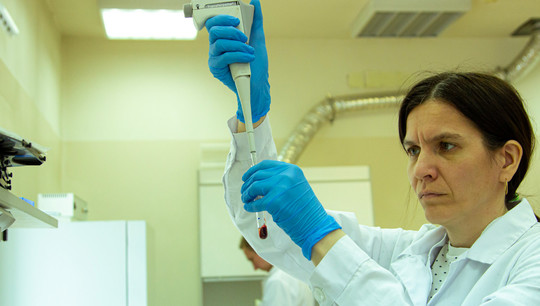
Ural scientists are developing a new type of test system that will help diagnose diseases at an early stage. It will track significant changes in immunity through blood biomarkers that reflect the state of the intestinal microbiota metabolome. According to the researchers, such systems do not exist today, and specialists in different countries are working to create them. The similar systems work according to different principles and are more complex in their application. The developers believe that hospitals, diagnostic centers and R&D centers of pharmaceutical companies may be interested in the new technology.
“We believe that our test system will simplify and reduce the cost of early diagnosis of immunodeficiency diseases. The analysis will be based on specific plasma biomarkers identified by chromatographic peaks. The biomarkers will be selected from the lipids, amino acids and vitamins found in blood plasma. These are metabolites of the intestinal flora that are altered as a result of adverse conditions in the body. This type of analysis will not only detect the presence of the disease at an early stage, but will also enable the selection of personalized treatment and optimal targeted therapy. Among other things, the analysis will require a minimal amount of blood,” says Elena Kovaleva, Full Professor at the UrFU Department of Technology of Organic Synthesis, who is leading the study.
The new test system is based on high-performance liquid chromatography-mass spectrometry (LC-MS). This method determines specific microbial markers in the blood, the amount of which depends on both the type of disease itself and the severity of its course, the researchers explain.
The first step was to test the system in laboratory animals. The mice were injected with a drug that lowered the animals’ immunity. The scientists monitored how the number of microbiota biomarkers changed: fatty acids, glycerolipids, phospholipids, etc. The next step is to find correlations between these identified biomarkers and those for humans. Overall, the researchers plan to develop software and use supercomputers and machine learning to analyze large amounts of data to produce more accurate results.
“Our system will require minimal sample preparation and we believe it will provide reliable analysis of individual lipids, amino acids and vitamins as microbial blood markers. Using a neural network, the analysis will be performed on more than 10,000 molecular markers,” concludes Elena Kovaleva.
The scientists also plan to patent the development and attract interested companies to the project. The developers plan to create a prototype of the device by 2025 and to complete the development of the technology and launch it on the market by 2027.
It should be noted that the system is being developed by specialists from the Scientific, Educational and Innovative Center of Chemical and Pharmaceutical Technologies of the Ural Federal University, the Institute of Immunology and Physiology of the Ural Branch of the Russian Academy of Sciences, and the Virom Research Institute of Viral Infections of the Federal Service for Supervision of Consumer Rights Protection and Human Welfare.
